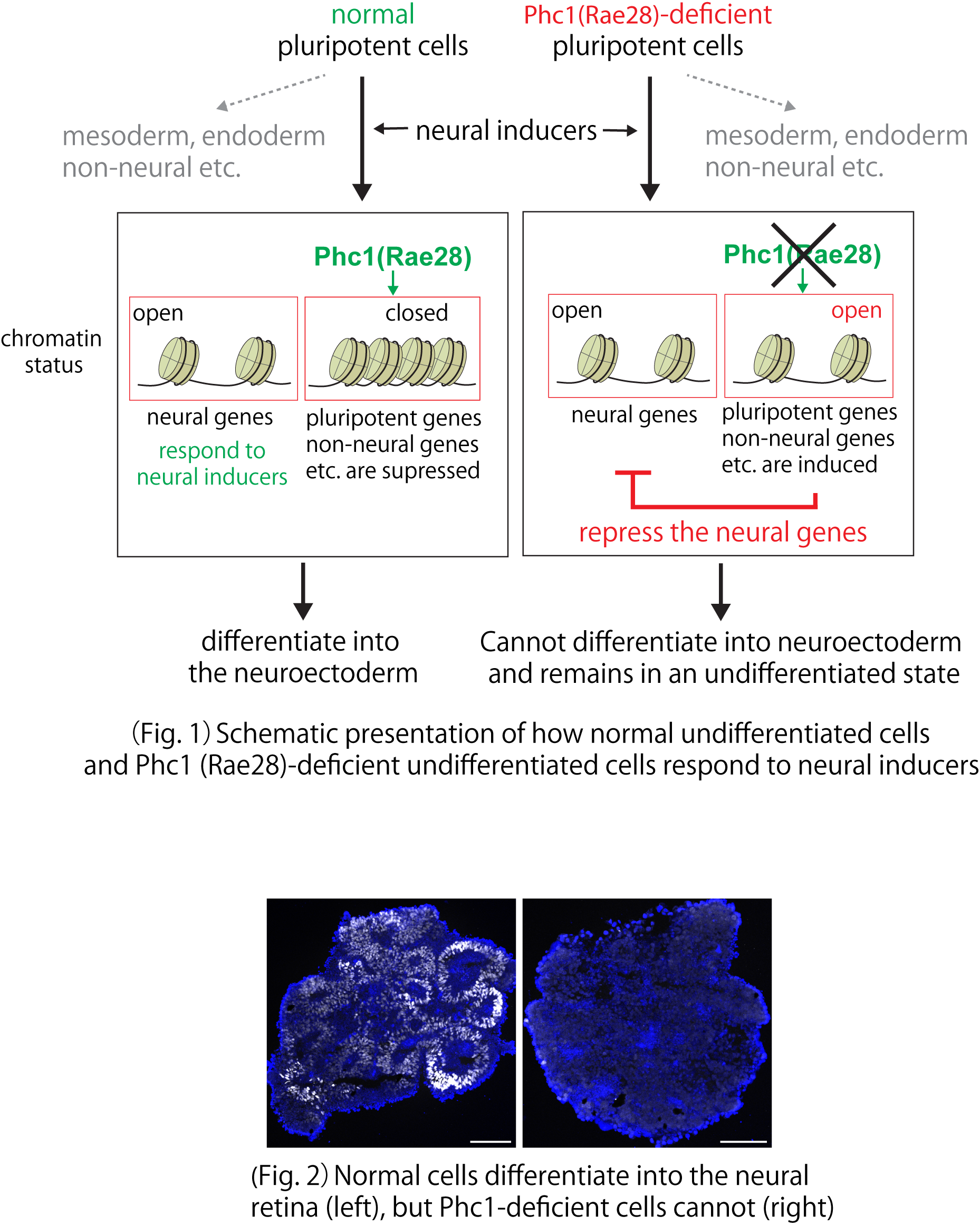Research outcomes
A mechanism controlling the genomic structure during early differentiation into neuroectoderm
Contributing to the development of more efficient differentiation methods into specific cells
A group of scientists from Nara Institute of Science and Technology (NAIST), the National Cardiovascular Center, and Japanese Red Cross Kinki Block Blood Center have uncovered that a one of the components of the polycomb-type of transcriptional repressor complex (PRC), Phc1 (Rae28), regulates the chromatin state of cells (Fig. 1) and plays a critical role for the process of undifferentiated into neural progenitor cells. The findings of this study will appear in the October 20th, 2023 issue of the scientific journal iScience.
In the initial stages of embryonic stem cell (ES cell) and iPS cell differentiation, the cells started to be categorised into groups such as ectoderm, mesoderm and endoderm. The process requires specific molecules (called “neural inducers”) that signal the cells to become neuroectoderm. As cells cannot go back to their undifferentiated state once they have differentiated, their genome structure was believed to significantly change, but the details were not clear.
The research team systematically made knockout cells of the PRC genes, and concluded that the protein Phc1 (Rae28) is a critical component protein for differentiating into the neuroectoderm. ES cells deficient from Phc1 cannot respond to neural inducers and remained the undifferentiated state (Fig. 2). On the other hand, Phc1 can normally differentiate into mesodermal and endodermal cells; therefore, Phc1 is particularly necessary for the neuroectodermal differentiation.
Furthermore, comparison of the chromatin status of normal and Phc1-deficient cells showed that the chromatin structure of the pluripotent genes remained loose in the Phc1-deficient cells, inhibiting the progression of the differentiation. It is therefore apparent that Phc1 governs chromatin states and endows cells with the ability (competence) to react to neural inducers.
In the future, it is expected that this method will be useful in the development of targeted cell differentiation techniques.

(Glossary)
Ectoderm, mesoderm, endoderm: A rough classification of cell characteristics at the early stages of differentiation. Ectoderm cells mainly differentiate into neuron and epidermis, mesoderm cells into muscles and blood cells, and endoderm into the gastrointestinal tract and thyroid gland.
Neural inducers: A group of extracellular proteins that act on undifferentiated cells and give them neural properties.
Chromatin: A complex of genomic DNA and surrounding proteins (histones). Gene expression does not occur when the complex is condensed (closed), and genes are expressed when it is loose (open).
Polycomb repressor complex (PRC): A protein complex involved in the transcription of genes required for embryonic development and cell differentiation. This complex is thought to be primarily involved in chromatin condensation (transcriptional repression) during cell differentiation by actively changing its member proteins.
Phc1: Polyhomeotic Homolog 1 is one of the component proteins of the above PRC. It was originally isolated under the name "Rae28" as one of the genes whose expression is upregulated when retinoic acid is added to the F9 culture cells.
<journal> iScience
<title> Acquisition of neural fate by combination of BMP blockade and chromatin modification
<authors> Agnes Lee Chen Ong, *Toshiya Kokaji, Arisa Kishi, Yoshihiro Takihara, Takuma Shinozuka, Ren Shimamoto, Ayako Isotani, *Manabu Shirai, *Noriaki Sasai (*: corresponding authors)
<DOI> 10.1016/j.isci.2023.107887
<URL> https://www.sciencedirect.com/science/article/pii/S2589004223019648
(The full text of Dr. Agnes Lee Chen Ong’s dissertation can be found at https://library.naist.jp/opac/book/108167)
Information about the Developmental Biomedical ScienceLaboratory can be found at the following website:
https://bsw3.naist.jp/eng/courses/courses212.html
( October 17, 2023 )
